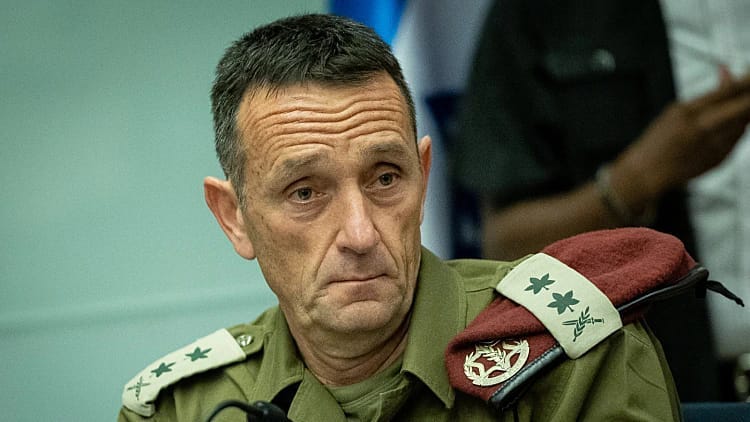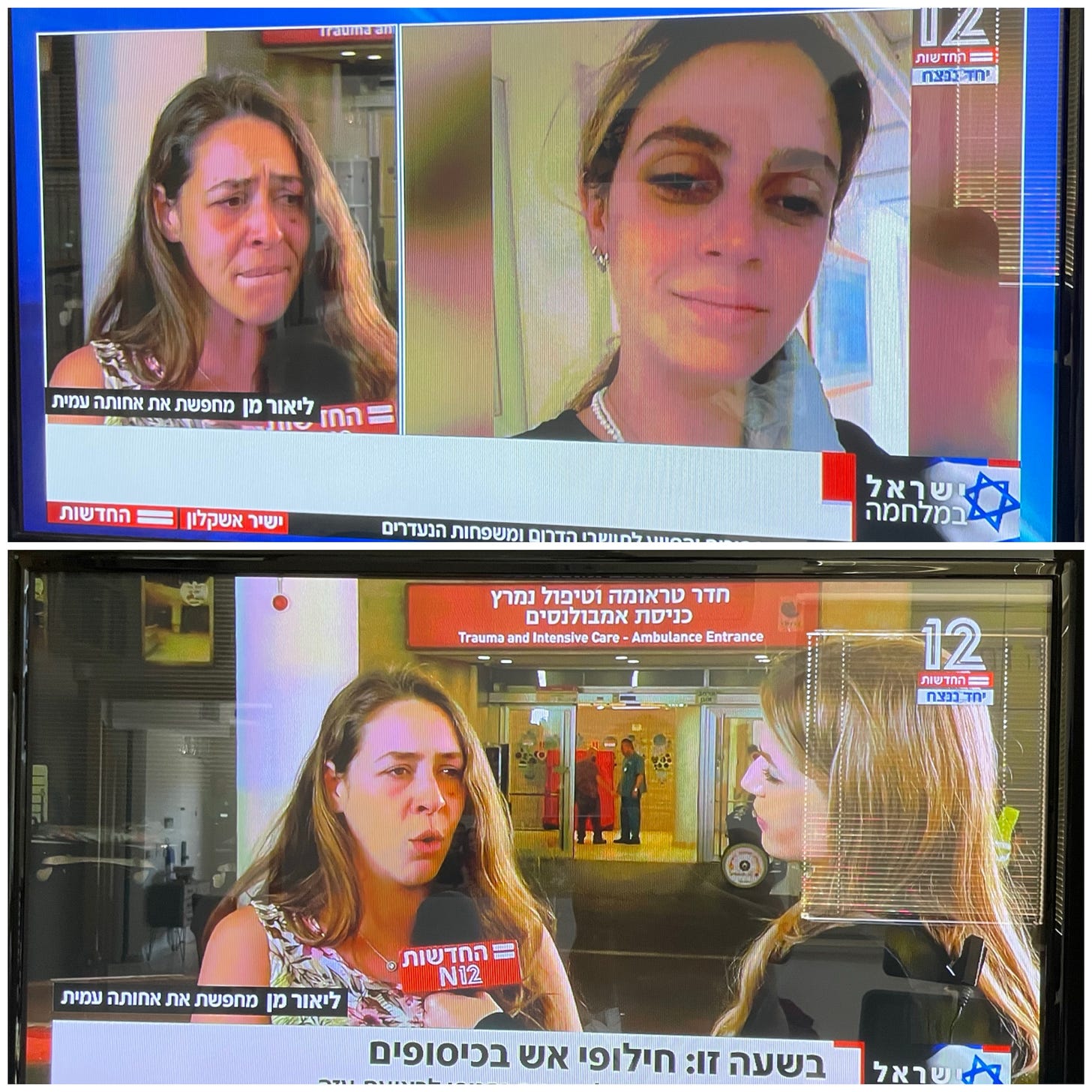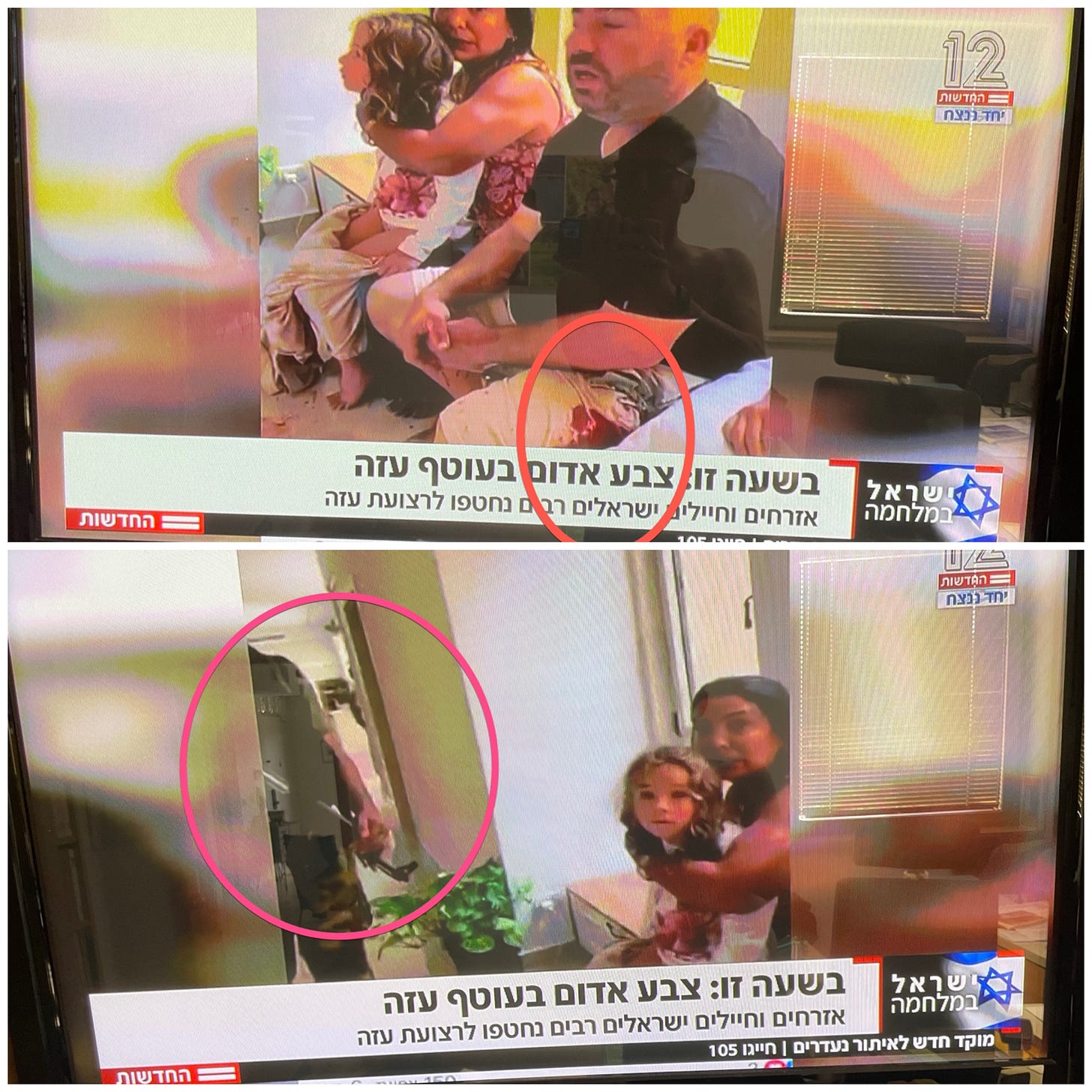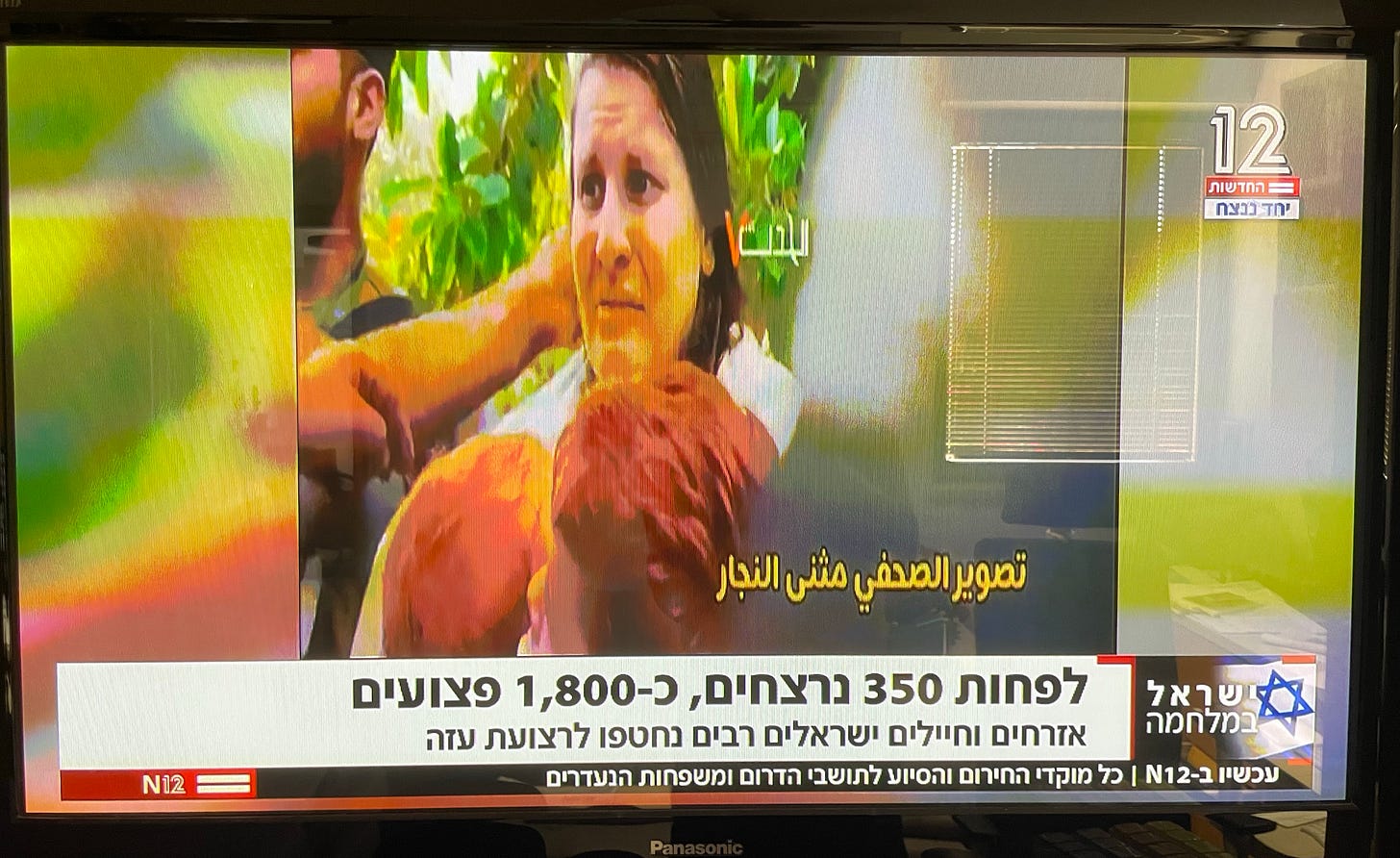The single worst day in Israel's history? Probably.
Other questions will follow, but for now, Israelis want to know just this: where is my sister? Where are my kids? And why does no one know?
Take a guess as to how many Israeli civilians were killed in the Yom Kippur War?
Zero. Not a single one.
Bludgeoned by the Syrians and the Egyptians, Israel still managed to fulfill the single most basic obligation of any government—to keep its citizens safe.
In the Yom Kippur War, Israel made massive mistakes with intel that it had and waited far too long to call up reserves. But it did have intel. And the top brass did fight over what to do about the intel.
They just got it wrong.
This week, there was no intel to fight about.
Yesterday, in a single day, Israel lost about as many civilians as it did soldiers in the entire Six Day War. And we’re far from done counting.
Yesterday may well have been the worst day in Israel’s history.
It’s just not clear that there isn’t worse to come.
We went to sleep last night—those of us who could peel ourselves away from the TV and the relentless flow of horrifying news—certain that we would awaken to Israel being back in Israeli hands. Yes, Hamas terrorists were still in control of some seven towns and there was “fierce fighting” (always a code that means “soldiers have been killed, but the censor says we can’t say that) in several locations. And true, the army inexplicably took many hours to get to places that are a 20 minute helicopter ride away. But still, the soldiers were finally there.
Now the tides would shift. For this was the IDF, on home territory, versus Hamas, which is not a professional army—and which, away from the border, would have no way to get reinforcements in. By the time we woke up, we knew, these battles would be over.
They weren’t. The news early this morning reported fierce gun battles still raging in several kibbutzim and towns; residents were still hiding in their safe rooms, more than 24 hours after the attack started, still hoping that the army might get to them in time. Then it was reported that Hamas was sending in reinforcements across the border—fighters, ammunition, food.
What?
I don’t know anyone who hasn’t thought that, at first, they’d misheard the news.
I went to minyan this morning at my regular shul. At the end, just as people started to file out, someone got up to read the Prayer for the State of Israel—which is normally recited only on Shabbat. The exodus to the door ceased, people turned around. It was silent in the room. Not a soul moved. People cast their eyes downward or upward, and answered “Amen.”
Then he continued with the Prayer for the Soldiers of the Israeli army. The same response.
He followed that with the Prayer for Hostages, a prayer that we’ve recited back in the Ron Arad days, the Zechariah Baumel days, the Gilat Shalit days. There’s a place in the middle where you insert the name of the hostage or hostages. Over the years, we all knew the names of those hostages—Arad, Baumel, Shalit and others—by heart. But this time, when he got to that spot in the prayer, he didn’t know what to say. What are their names? How many are there?
Could it really be as high as a few dozen, as some were intimating?
He paused, just said “the missing women and men.”
We didn’t even have enough information to say the prayer.
We began to fan out of the synagogue, clusters of us in each direction. And then, at the very same instant, we all got the same message on our phones and watches. Israel announced that there were about 100 hostages being held in Gaza. You could hear the gasps from the people walking home. Across the street, I saw a man just about my age slump into a light pole, unable to believe what he’d just read. Two young men ran up to him to steady him.
The pace of the news cycle is too fast for it to be worthwhile for us to summarize it here. (I described some of what the first day was like in this piece for Bari Weiss’ The Free Press.)
What matters now is for people who care to understand is what people here are feeling: for the first time in their lives—it feels as if there is no functioning country. People don’t know where their family members are, but what little information they’re getting, they’re getting from Hamas.
What follows—to give a sense of the anguish and heartbreak—are four brief vignettes from this morning’s news—
a woman looking for her sister who was working as a nurse in Be’eri, now gone without a trace
a family who saw Hamas television pictures of their family being held hostage in their kibbutz home, and now, presumably, in Gaza
a family who saw a Hamas video of their daughter and their grandchildren, petrified, as they were being rounded up by Hamas
a former general whose son messaged from from the safe room, so he grabbed his pistol made made his way to Kibbutz Nahal Oz—and what happened
The Search for Amit Mann
The woman on the left in the upper picture is Lior Man, speaking to Channel 12 about her sister, Amit, on the top right. Amit was working as a nurse in Be’eri, the kibbutz where fifty people were held hostage in the dining room yesterday afternoon until they were somehow freed (details are very sketchy).
Yesterday morning, Amit texted her family to say that she could hear shooting and rockets. Then she texted to say that she saw terrorists outside the building. Then she texted to say that the terrorists were headed to them, but that men in the building, who happened to be armed, were firing back and keeping them at bay. Then she wrote that the terrorists were at the door.
Then she stopped texting.
Instead, her sister said, she set the phone to a voice call so her family could hear all the sounds in the room. The family could hear shooting, screaming of “Please Don’t!”, more shots, then quiet.
The phone went dead.
Then she texted again. Hem alai “They’re on me,” she wrote. Zeh HaSof. “This is the end.”
That was the last they heard of her. They don’t know, said Lior standing outside the emergency room of one of the many hospitals she and her family have searched, if Amit was killed and is still in the clinic because more than 24 hours later, the army is still fighting to control Be’eri. Or if she was taken hostage into Gaza. Or if she was killed and her body was taken. Or maybe she was wounded and is in a hospital? Which?
They have no idea. And in this Startup Nation, at that point in the morning, there was no source of lists. No news. No calls from the army. Only Hamas was providing information that some Israelis could use to confirm where their family members were.
If Amit has been killed, she’s now one of about 600. If she’s hostage in Gaza, she’s one of about 100 (as far as we know). If she was wounded and is hospitalized, she’s one of more than 2000, about 350 of then critical or serious.
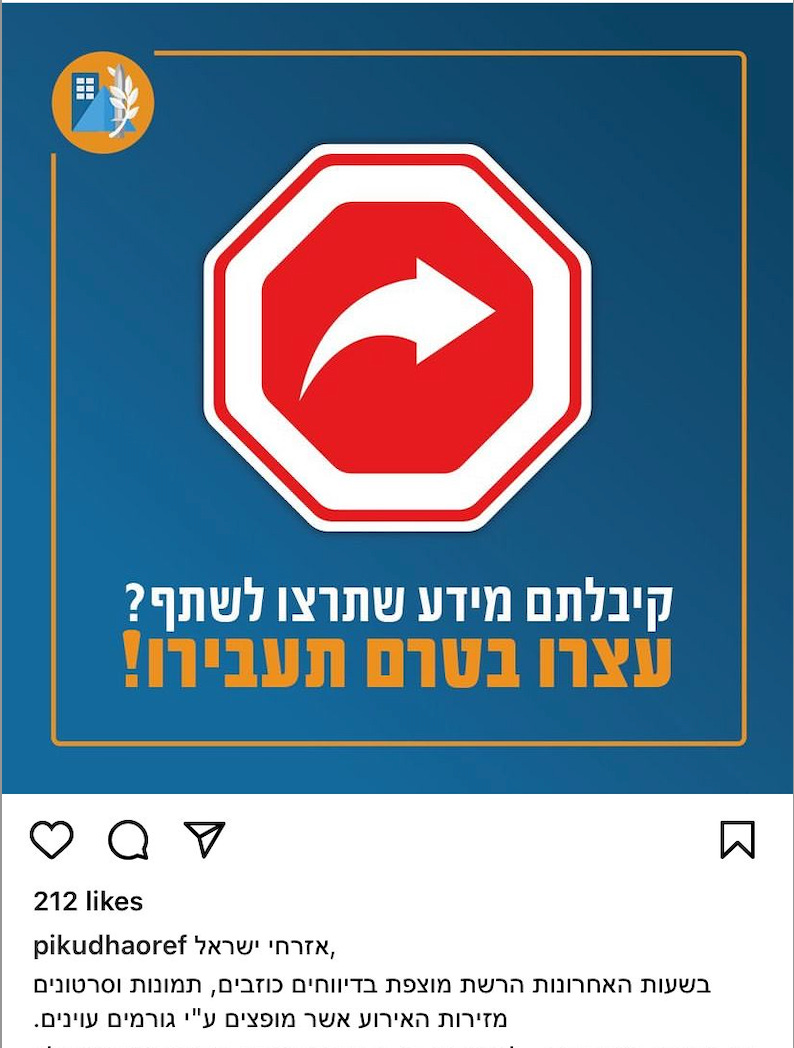
The army’s inability to communicate with citizens has been such a colossal failure that Israelis began sharing updates that Hamas was posting online. The Home Front Command (Pikkud HaOref) took to Instagram to beg Israelis not to do that, so that the army could reach families first.
But the army hasn’t been reaching any families, people said—and ignored the plea. So it is from Hamas and Israeli society media where many are getting their information.
Wounded and hostages in their own home; by now, presumably in Gaza
Channel twelve cut to a different family. The video footage showed their siblings and their kids’ kids at home. The father clearly has a severe leg wound, bleeding badly. And in the lower screenshot, from a video that could only have been taken by Hamas, you see the armed gunman in their house.
No one has heard from the them since yesterday. They are, presumably, in Gaza.
Hamas TV showing Israelis as they’re captured
Another family interviewed on Channel 12 knows exactly what happened to their kids— they were kidnapped by Hamas and taken to Gaza. As can see from the shot above, even Israeli TV was ignoring requests not to show Hamas clips. You can see the Arabic on the screen; though a bit fuzzy, the expression of the woman just captured with her children is the stuff of nightmares.
Imagine the parents/grandparents with that image being the last anything they have from or about her.
Keep reading with a 7-day free trial
Subscribe to Israel from the Inside with Daniel Gordis to keep reading this post and get 7 days of free access to the full post archives.


